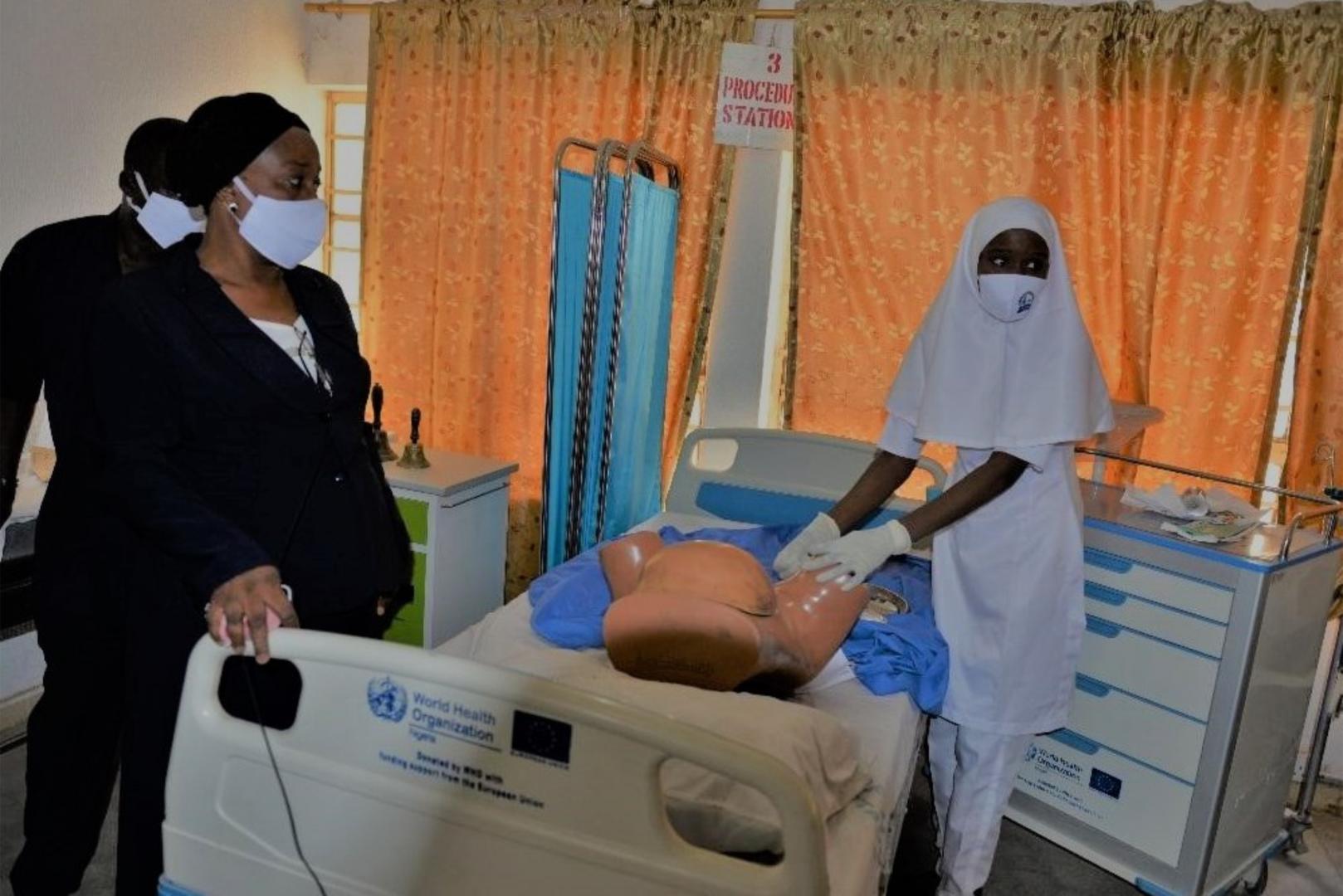TOYIN ADEBAYO, ABUJA
The College of Nursing and Midwifery, Maiduguri in Borno state, has secured full accreditation from the regulatory body, the Nursing and Midwifery Council of Nigeria.
The accreditation comes 40 years after inception and made possible with recent donation of modern equipment and tools by WHO with funding support from the European Union.
Items donated include laboratory equipment, classroom furniture, library books, practical teaching tools, hospital beds and computers. According to the students and staff of the institution, these equipment and facilities have also made teaching and learning a lot easier and friendly.
Hajia Rukaiya Shettima, the Provost of the College of Nursing and Midwifery, Maiduguri, Borno state said, “I have the opportunity to share two distinct yet complementary experiences of this school, “One, as a student nurse in the then School of Nursing and now as a staff, in fact, the provost of the school, now College of Nursing and Midwifery.
According to her, although the School of Nursing was established in 1971 by the defunct government of northern Nigeria, I gained admission to study nursing in 1981. As a student nurse in the 1980s, I still recall how we struggled to memorize procedures, role-play steps and imagine practical approaches for activities we hadn’t adequate equipment for practicals. Despite the challenges, studying nursing in this school back in the 1980s was fun and a privilege, yet more arduous.”
Without the full accreditation of the Borno College of Nursing and Midwifery, Hajiya Rukaiya confirms that the school was limited to a sparse curriculum and few students. “The school hadn’t full accreditation from Nigerian Nursing Council and admitted just a few students due to inadequate facilities and teaching staff. Although we did well for many years in national and international examinations, it took uncommon dedication and commitment to success.”
Accreditation ensures the same standards and criteria across all nursing programmes in Nigeria irrespective of locations while ultimately improving the quality of nursing education and keeps the curriculum up to date on current trends in nursing and healthcare. Without full accreditation, a nursing school is limited to admitting a certain number of students and offering a handful of healthcare programmes.
Hajiya Rukaiya’s experience as a staff and indeed the manager of the College is now different. “Now as a staff of the college since 1991, things have changed a lot,” she added. The quality of training and learning started declining over the years due to obsolete equipment, outdated facilities and exodus of many skilled teachers who left for safety or for greener pastures especially in the last decade associated with the insurgency in north-east Nigeria. It was not until 2016 that the government of Borno state upgraded the school to a College of Nursing and Midwifery.
“As a College of Nursing and Midwifery, the school still operated with partial accreditation until WHO, with funding support from the European Union, supported the College with requisite laboratory equipment and reagents, information technology tools including computers, modern nursing textbooks and classroom facilities which enabled full accreditation in 2020 after forty years from inception.
“With the full accreditation today, teaching and learning at the College of Nursing and Midwifery in Maiduguri have improved tremendously. In fact, in our last examination, 98% of our students scored 95% in nursing exams. Presently, the college admits as much as three times the number of students admitted hitherto in Basic Nursing programmes, Basic Midwifery, Community Nursing and Community Midwifery. Also, the college curriculum has been expanded to include community midwife and community nursing among others. The college can now award a Higher National Diploma in Nursing and Midwifery. Many thanks to WHO supported by the European Union.”
Prior to the insurgency, northeastern Nigeria had one of the lowest health development indicators in Nigeria. As the crisis festered for more than a decade, health indices deteriorated. “More than two-thirds of health facilities became completely or partially destroyed with a dramatic drop in childhood vaccination rates, leaving children at greater risk of preventable life-threatening diseases such as polio, malaria, meningitis and measles,” says Dr. Collins Owili, Emergency Manager, WHO health emergency programmes for north-east Nigeria.
Over the years, the healthcare workforce in Borno state weakened and declined tremendously. Affected populations remain at high risk of epidemic-prone diseases like cholera, measles, meningitis, and viral fevers such as Lassa fever and yellow fever. Endemic malaria accounts for 50% of mortality and morbidity, a proportion that is higher than all other causes of death combined including cholera, measles and hepatitis E. Also, one in five children is severely malnourished within a context of high malaria prevalence and a weakened healthcare system.
Hence, it became urgent and essential to strengthen the healthcare system, build the capacity of available health staff, strengthen the curriculum of healthcare institutions and provide urgently needed care which has become unavailable or inaccessible to many people in need.
With funding support from EU, USAID, governments of Canada and Germany and other donors, WHO is responding to the direct impact of the crisis on the populations by providing technical guidance, capacity building of local health workers, setting standard protocols, disease surveillance and response to disease outbreaks. Supporting the College of Nursing and Midwifery, in Maiduguri with training equipment and facilities for improved healthcare teaching and learning will impact on the healthcare delivery system now and in the long term.

